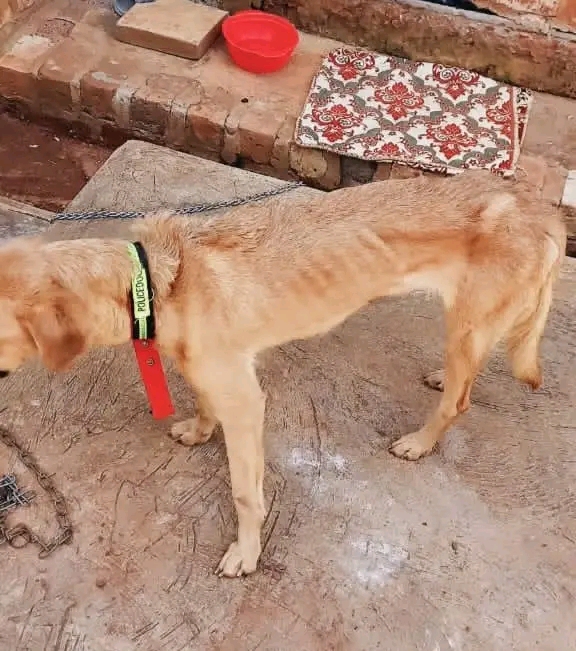Masha , the dog from Migadde (Wakiso) with Liver disease
On one bustling day, we fielded a call from a new client residing in Migadde, located in Wakiso District. Concerned and perplexed, he relayed the distressing news of losing two of his beloved dogs under mysterious circumstances. Left with one remaining canine companion, Masha, he noticed troubling similarities in her condition, mirroring the symptoms exhibited by the unfortunate predecessors. These symptoms included a gradual decline in weight, persistent vomiting, excessive thirst, and a complete loss of appetite. The absence of a definitive diagnosis for the ailment that claimed the lives of his other pets only added to his anguish. Recognizing the urgency of the situation, we promptly scheduled an appointment with the client, prioritizing early slots since his dog was in a critical condition.

Masha, she was emaciated, anorexic and lethargic
Management
In Migadde, Masha underwent a thorough examination, during which we collected blood samples for laboratory analysis. Her physical condition was dire, presenting with severe emaciation, anorexia, and lethargy.
Subsequent lab results indicated the presence of liver disease, suspected to be induced by aflatoxins found in her food. With this diagnosis in hand, the veterinary team promptly initiated Masha on a regimen of supportive treatments aimed at stabilizing her condition.
TREATMENT
Through five days of intensive and targeted therapy, Masha responded positively to the treatment regimen. Her resilience shone through as she gradually regained her strength and vitality. Following her remarkable recovery, comprehensive recommendations were provided to facilitate her return to optimal health and body condition.
Masha’s successful recovery can be attributed largely to the timely intervention of her pet parents. They Promptly seeked assistance from professionals once they noticed unusual signs or symptoms. Liver disease, as experienced by Masha, demands careful management and warrants exercising caution in its treatment and care.

Masha later after full recovery
Overview of liver disease
Liver disease represents a prevalent condition in dogs, manifesting in various forms. While certain types of liver diseases are relatively straightforward to treat, others pose more serious challenges, necessitating continuous veterinary attention. In this overview, we present key symptoms of liver disease in dogs and offer preventive measures for dog owners to protect their pets’ health.
Symptoms
Liver disease poses a significant health risk for dogs, with diverse symptoms that can range from mild to life-threatening. Recognizing these signs promptly is crucial for timely veterinary intervention and improved outcomes. Common symptoms include loss of appetite, vomiting, diarrhea or constipation, lethargy, weight loss, jaundice. others include increased thirst and urination, swollen abdomen, and neurological issues like seizures or confusion. These symptoms vary in severity depending on the stage of the disease. Loss of appetite, vomiting, and jaundice are often among the first signs noticed by owners. Increased thirst and urination may indicate the body’s attempt to rid itself of toxins. Severe cases may exhibit neurological symptoms. Early detection through regular veterinary check-ups and prompt treatment can greatly enhance the prognosis for affected dogs. Owners should be vigilant and seek immediate veterinary care if any concerning symptoms arise. Timely intervention is crucial in managing liver disease in dogs.
Causes
Liver disease in dogs can stem from a variety of causes. Some of the most common culprits include exposure to toxins like medications (e.g., ibuprofen, acetaminophen), chemicals, and poisons (such as aflatoxins found in contaminated food or chocolate). Additionally, infections caused by viruses, bacteria, or parasites can wreak havoc on the liver. Certain breeds, like the Bedlington Terrier, Doberman Pinscher, and West Highland White Terrier, are genetically predisposed to liver issues. Tumors in the liver can also induce liver disease in dogs. Moreover, a poor diet characterized by excessive fat or processed foods can strain the liver, leading to gradual damage over time.
Treatment and prevention of Liver Disease in Dogs
Recognizing symptoms and seeking prompt veterinary care is crucial for diagnosing and managing liver disease in dogs effectively. Early detection allows for timely intervention, which can significantly improve the prognosis for affected pets. Veterinary evaluation for liver disease can encompass physical exams, blood tests, imaging studies, and other diagnostic procedures to assess liver function and pinpoint the root cause of the illness. this is then followed by a treatment regimen developed by the attending veterinarian.
The optimal strategy for preventing liver disease in dogs centres on prioritizing their overall health and wellness. A key component of this approach involves providing a well-balanced diet tailored to your dog’s specific needs. This should be based on factors such as age, breed, and activity level. Avoiding excessive consumption of fatty or processed foods is crucial, as these can strain the liver and contribute to disease development.
Maintaining your dog at a healthy weight is equally important, as obesity can exacerbate liver-related issues. Regular exercise and portion control play pivotal roles in achieving this goal. Additionally, ensuring your canine companion is shielded from exposure to toxic substances is essential. This includes securely storing household chemicals and refraining from administering human medications without veterinary guidance, as these can potentially harm the liver.
Furthermore, scheduling routine veterinary check-ups is imperative for early detection of liver disease. During these appointments, veterinarians can conduct blood tests to identify any signs of liver dysfunction in its nascent stages. This proactive approach enables prompt intervention and management, optimizing the prognosis for affected dogs. By implementing these preventive measures, dog owners can effectively safeguard their furry friends against the debilitating effects of liver disease.

